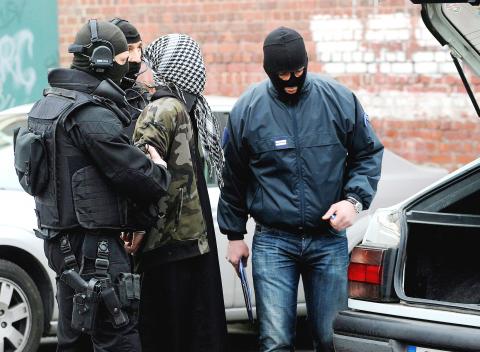Once again, France woke to news of a string of dawn raids against suspected Islamists across the country, from the old industrial heartlands of the north to Marseille on the southern coast. Days earlier, rolling TV-news and breakfast bulletins broadcast dramatic images as elite anti-terrorist squads in black body armor smashed windows and bashed down doors shouting “Police,” emerging with handcuffed suspects with their faces covered, on residential streets from Nantes to Toulouse.
Less than three weeks before the first round of the presidential election, France is gripped by one of its biggest crackdowns on suspected radical Islamists in recent memory. Amplified by TV coverage, it has been led by an unrelenting French President Nicolas Sarkozy, who is also battling for re-election. Opposition politicians now openly question whether the timing and TV crews are as much linked to electioneering as anti-terrorist crime prevention.
France is still in a state of shock and confusion after Mohamed Merah, a 23-year-old unemployed panelbeater from Toulouse, went on a 10-day killing spree across southwest France, executing three paratroopers and shooting children and a rabbi at the gates of a Jewish school. Following a dramatic 32-hour siege at his flat, Merah died in a hail of police bullets as he jumped from the balcony. However, questions remain over how Merah — who claimed inspiration from al-Qaeda, was heavily armed, on police intelligence files and had been under surveillance — was not picked up earlier and his attacks prevented. Some commentators warn that the new anti-terrorist crackdown, which included the deportation of a handful of preachers, should not be used as a smokescreen to distract from potential failings in the Merah operation.

Photo: EPA
The right-wing Sarkozy had long ago seen his election strategy compared with that of former US president George W. Bush’s 2004 fight for re-election: styling himself as the only trustworthy protector of the nation in the face of serious threat. A month ago, the danger was impending financial meltdown. Now, it is closer to Bush’s own target: Islamist fundamentalism and terrorism. Sarkozy last week likened the Toulouse killings to France’s Sept. 11. The scale of the attacks may be different, he said, but the national “traumatism” was the same.
The justice system will have the last word on the arrests, which were not directly linked to Merah. Preliminary charges have been filed against 13 alleged members of a banned fundamentalist group. An intelligence chief suggested militants were planning a kidnapping. The 10 arrested on Tuesday were suspected of links to Islamist Web sites and of threatening violence in online forums.

In the sweltering streets of Jakarta, buskers carry towering, hollow puppets and pass around a bucket for donations. Now, they fear becoming outlaws. City authorities said they would crack down on use of the sacred ondel-ondel puppets, which can stand as tall as a truck, and they are drafting legislation to remove what they view as a street nuisance. Performances featuring the puppets — originally used by Jakarta’s Betawi people to ward off evil spirits — would be allowed only at set events. The ban could leave many ondel-ondel buskers in Jakarta jobless. “I am confused and anxious. I fear getting raided or even

Kemal Ozdemir looked up at the bare peaks of Mount Cilo in Turkey’s Kurdish majority southeast. “There were glaciers 10 years ago,” he recalled under a cloudless sky. A mountain guide for 15 years, Ozdemir then turned toward the torrent carrying dozens of blocks of ice below a slope covered with grass and rocks — a sign of glacier loss being exacerbated by global warming. “You can see that there are quite a few pieces of glacier in the water right now ... the reason why the waterfalls flow lushly actually shows us how fast the ice is melting,” he said.

RISING RACISM: A Japanese group called on China to assure safety in the country, while the Chinese embassy in Tokyo urged action against a ‘surge in xenophobia’ A Japanese woman living in China was attacked and injured by a man in a subway station in Suzhou, China, Japanese media said, hours after two Chinese men were seriously injured in violence in Tokyo. The attacks on Thursday raised concern about xenophobic sentiment in China and Japan that have been blamed for assaults in both countries. It was the third attack involving Japanese living in China since last year. In the two previous cases in China, Chinese authorities have insisted they were isolated incidents. Japanese broadcaster NHK did not identify the woman injured in Suzhou by name, but, citing the Japanese

RESTRUCTURE: Myanmar’s military has ended emergency rule and announced plans for elections in December, but critics said the move aims to entrench junta control Myanmar’s military government announced on Thursday that it was ending the state of emergency declared after it seized power in 2021 and would restructure administrative bodies to prepare for the new election at the end of the year. However, the polls planned for an unspecified date in December face serious obstacles, including a civil war raging over most of the country and pledges by opponents of the military rule to derail the election because they believe it can be neither free nor fair. Under the restructuring, Myanmar’s junta chief Min Aung Hlaing is giving up two posts, but would stay at the